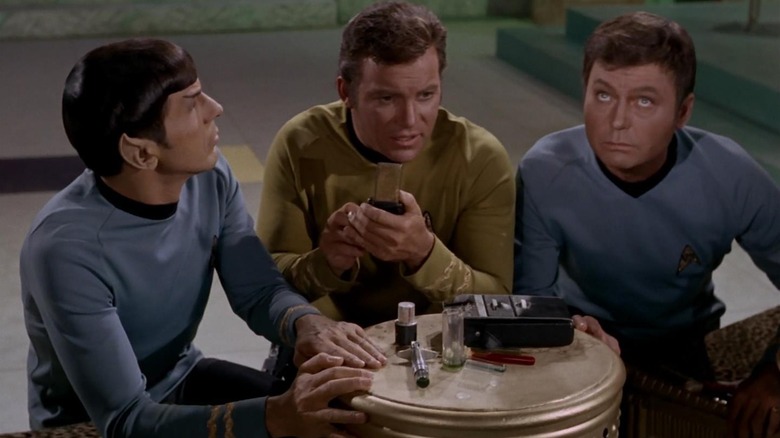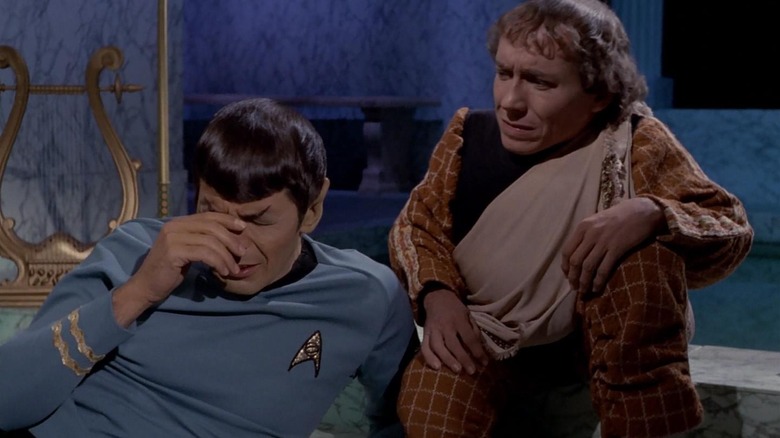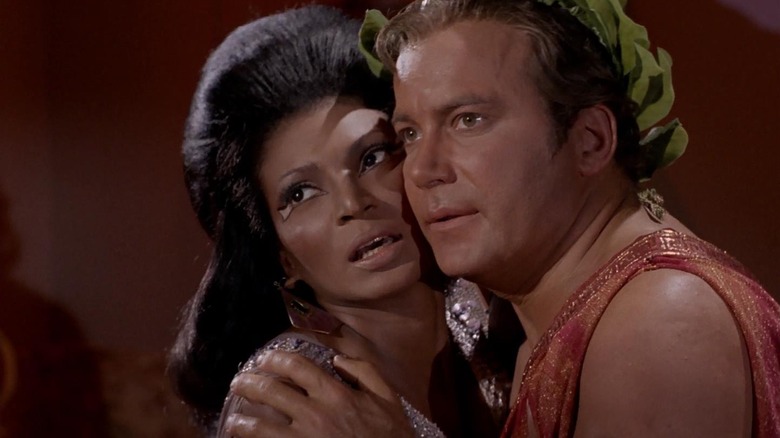Star Trek: The Original Series Had An Unforgettable Episode Banned In The UK For Decades
In the "Star Trek" episode "Plato's Stepchildren" (November 22, 1968), Captain Kirk (William Shatner), Spock (Leonard Nimoy), and Dr. McCoy (DeForest Kelley) beam down to a nearby planet to investigate a distress call. They find no distress, but a species of ultra-powerful hedonists dressed in classical Greek garb. They drink wine, lounge about on couches, and call themselves Platonians. They also have eerie telepathic powers that allow them to manipulate others to their will. Over the years, the power has gone to their heads, and they now operate without morals, doing whatever they please, believing that they are like the philosopher kings Plato wrote about in "The Republic."
Kirk, Spock, and McCoy will immediately become enslaved by the Plantonians, notably their leader, an arrogant a-hole named Parmen (Liam Sullivan). The Platonians will, for their own amusement, psychically force the Enterprise crew to act against their will. They force Kirk to behave like a horse. They force Spock to experience emotions, a grievous violation for him. In the episode's most famous scene, the Platonians kidnap Uhura (Nichelle Nichols) from the Enterprise and force her and Kirk to kiss, something neither of them wants.
For many years, a rumor ran rampant that "Plato's Stepchildren" was banned in the Southern states of the U.S. because of that area's miscegenation laws and history of racism. It was certainly uncommon that a Black woman and a white man were seen kissing on mainstream American TV. It turns out, however, that no such racist bans were ever enacted. NBC worried that "Star Trek" would receive angry letters from Southern viewers over the kiss, but they never actually did. Indeed, the general public enacted no real backlash.
A rumor that is true: "Plato's Stepchildren" was actually banned in the UK for many years, not because of anything racially motivated, but because, well, all the torture and sadism in the episode was horrifying.
Plato's Stepchildren was banned for its depictions of torture
To repeat: the kiss between William Shatner and Nichelle Nichols was not as controversial as historical rumors might have one believe. This bears repeating because it was repeated among Trekkies for years, and we all believed that "Plato's Stepchildren" had been banned in the Deep South for racist reasons. The rumors of a racist ban ran concurrent with equally widespread rumors that the Shatner/Nichols kiss was the first-ever interracial kiss between a Black person and a white person on television. This is also not true. There are many prior instances of interracial kisses, notably a 1955 production of "Othello" on British television that featured a kiss between Rosemary Harris and Gordon Heath. "Plato's Stepchildren" is — and this is a record it openly claims — the first time a Black woman and a white man kissed each other on American television.
In England, "Plato's Stepchildren" was targeted for censorship for entirely different reasons. A great deal of the episode involves the Platonians using their psychic powers to force people to humiliate themselves against their will. They weep in embarrassment while their Platonian captors laugh in sadistic glee. That, it seems, was far more disturbing than anything a racist viewer might concern themselves with.
Indeed, the BBC refused to air several episodes of "Star Trek" upon their initial run because they were too scary or cruel. "Star Trek" first began airing in England in 1970, and the BBC censors removed multiple episodes from the series to protect sensitive viewers. We must pause to note that the BBC classified "Star Trek" as a children's program, so they were touchier about the show's violence than they were about other, more adult-oriented programs. /Film previously wrote about the episode "The Empath" (December 6, 1968), which was banned in the UK for similar reasons. The BBC also banned the episodes "Miri" and "Whom Gods Destroy."
It took decades before Plato's Stepchildren was let back on the air
"Whom Gods Destroy," incidentally, was banned in the UK not for depictions of torture, but because Yvonne Craig performs a striptease-like dance that the British censors found too sexy. "Miri" did have depictions of cruelty, but the BBC also hated its disturbing depictions of a deadly, rash-like disease. According to an article in Den of Geek, the ban on these episodes was still in place in 1979, even after the BBC reviewed them. In 1984, the BBC still wouldn't budge, saying:
"You will appreciate that account must be taken that out of 'Star Trek's large and enthusiastic following, many are juveniles, no matter what time of day the series is put into the programme schedules. A further look has been taken following the recent correspondence, but I am afraid it has been impossible to revise the opinion not to show these episodes."
"Star Trek" creator Gene Roddenberry naturally opposed the ongoing bans, pointing out that he deliberately wrote those episodes to be painful, as pain is a part of adult life. He also knew that adult audiences had an interest in sex and violence, and wanted them to be able to see the show as he intended. The clash seemed to arise from the mere fact that the BBC always saw "Star Trek" as a series for kids when it was never intended as such.
The banned episodes in question were finally broadcast to the British public when "Star Trek: The Next Generation" debuted and started proliferating throughout Europe in the early 1990s. But then, the BBC felt that all of "Star Trek" deserved to be in rotation, and they finally let the offensive episodes out of the vault.


